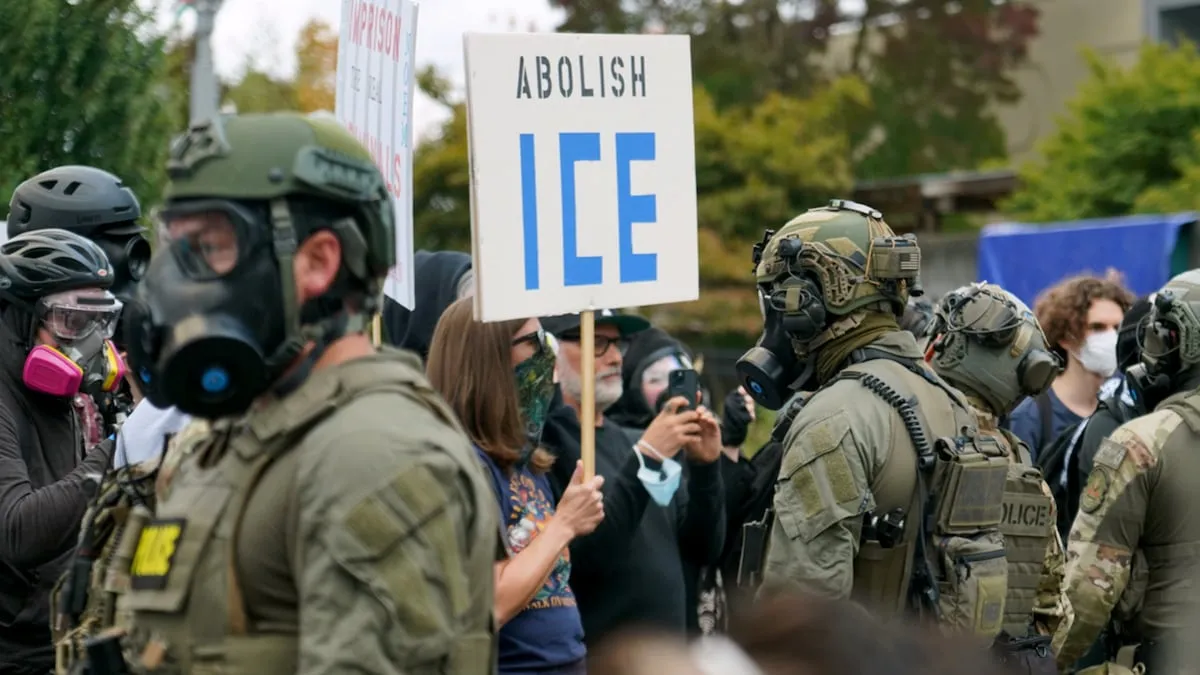
An unprecedented weekend has placed Portland at the forefront of national headlines as President Trump intensifies his efforts to deploy National Guard members into the city. This move faces strong opposition from local and state elected officials, as well as a federal judge. The dramatic developments unfolded over a 48-hour period, marked by legal battles and escalating protests.
On Friday, U.S. District Court Judge Karin Immergut presided over a hearing that revealed starkly different narratives regarding the ongoing protests at the U.S. Immigration and Customs Enforcement (ICE) facility in South Portland. The hearing centered around President Trump’s attempt to deploy 200 members of the Oregon National Guard under federal command.
Attorneys for the Trump administration claimed that protesters had violently assaulted federal law enforcement officers, citing incidents involving rocks, bricks, and incendiary devices. They alleged significant damage to federal property, including broken windows and security systems. In contrast, attorneys representing the city of Portland and the state of Oregon presented evidence indicating that protests had been largely peaceful, with reports from police suggesting minimal activity just before Trump’s contentious social media announcement.
The Trump administration announced a comprehensive investigation into the Portland police's handling of the ICE protests, particularly following the arrest of conservative journalist Nick Sortor. Memos obtained by OPB revealed that the administration sought body camera footage related to Sortor’s arrest and data regarding the enforcement of zoning laws around the ICE facility. White House Press Secretary Karoline Leavitt described the anti-ICE protesters as “violent mob members,” exacerbating tensions in the community.
Saturday saw a large march towards the ICE detention facility, which began in a peaceful manner as hundreds gathered from a nearby park. However, the peaceful protest escalated when federal law enforcement officers deployed tear gas and smoke canisters to disperse the crowd, leading to several arrests.
Later that afternoon, Judge Immergut granted a temporary restraining order in favor of the state of Oregon and the city of Portland, effectively blocking the Trump administration’s deployment of the Oregon National Guard. She deemed the federal government’s arguments unconvincing, asserting that the incidents at the ICE facility did not warrant such drastic measures and warning that the deployment could further inflame tensions.
In a surprising turn of events, shortly after Judge Immergut's ruling, federal law enforcement escalated their tactics against protesters in Portland. With officers using tear gas and flash-bang grenades, the situation intensified as they pushed crowds down city streets. The presence of videographers capturing the events added a layer of spectacle to the already charged atmosphere.
On the same day, the Trump administration filed a notice of appeal to the 9th U.S. Circuit Court of Appeals in response to the ruling, indicating their intent to challenge the decision legally.
As the weekend progressed, residents near the ICE facility woke up to clean up the aftermath of the protests. Reports highlighted the lingering effects of tear gas and the community's mixed feelings about the ongoing situation.
In a shocking move, Trump announced plans to circumvent Judge Immergut's ruling by deploying members of the California National Guard to Portland, drawing swift condemnation from both California Governor Gavin Newsom and Oregon Governor Tina Kotek.
During a press conference, Trump repeated unfounded claims about Portland being “burning down to the ground,” despite evidence contradicting his narrative. Meanwhile, California and Oregon joined forces in court to contest the Trump administration's decision to send federal troops into the state.
As tensions continued to mount, Texas also entered the fray, with reports suggesting that up to 400 members of the Texas National Guard might be deployed to Portland under the Trump administration's orders.
Late Sunday evening, Judge Immergut held another hearing, ultimately issuing an order prohibiting the deployment of any federalized National Guard members to Oregon. This ruling followed Texas Governor Greg Abbott's provocative comments about enforcing federal protection measures, thereby reinforcing the legal boundaries in place.
The weekend's events in Portland reflect a complex interplay of local governance, federal authority, and community response amidst ongoing national tensions. As developments continue to unfold, the situation in Portland remains a focal point of attention both locally and nationally.